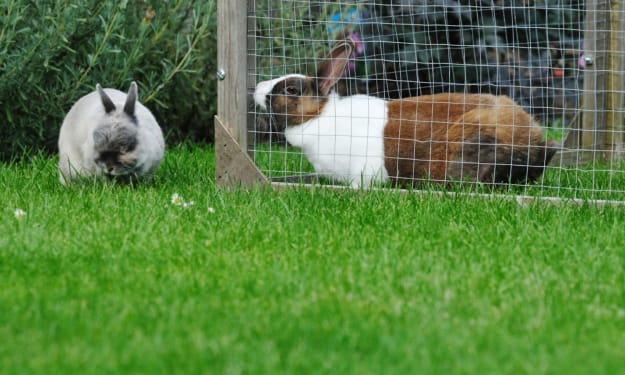Understanding Rabbit Aging and Senior Care
The Complete Guide

Caring for Your Rabbit's Golden Years
As our beloved rabbit companions grow older, it's essential to understand the unique challenges and considerations that come with their senior years. Rabbits, like humans, experience physical and behavioral changes as they age, and providing them with the proper care and attention can greatly improve their quality of life during this stage. In this comprehensive guide, we'll explore the intricacies of rabbit aging, common health concerns, and practical tips to ensure your rabbit's golden years are filled with comfort and happiness.
The Aging Process in Rabbits
Rabbits are generally considered senior or geriatric around 5-7 years of age, depending on their breed and size. Smaller breeds tend to have a longer lifespan, with some living up to 12 years, while larger breeds may only live 8-10 years on average. As rabbits age, they undergo a variety of physical and behavioral changes that require special attention from their caregivers.
Physical Changes
One of the most noticeable changes in aging rabbits is a decrease in their overall activity level. Older rabbits may become less energetic, preferring to spend more time resting and sleeping. This is a natural consequence of the aging process, as their metabolism and muscle mass gradually decline.
Additionally, senior rabbits may experience a decrease in their grooming abilities, leading to a unkempt or matted appearance. This can be due to arthritis, decreased flexibility, or simply a lack of energy. Regular brushing and grooming become even more important for older rabbits to maintain a healthy coat and prevent skin issues.
Dental health is another area of concern for aging rabbits. Their teeth continue to grow throughout their lives, and as they get older, the wear and tear on their teeth can lead to overgrowth, malocclusion, and other dental problems. Regular veterinary check-ups and dental care are crucial to ensure your rabbit's teeth remain healthy and comfortable.
Behavioral Changes
As rabbits age, their behavior may also undergo significant changes. Older rabbits may become more irritable or less tolerant of handling and interaction. They may also exhibit increased anxiety or fear, especially in unfamiliar environments or situations.
It's important to be patient and understanding with your senior rabbit, as they may require more quiet time and a calmer, more predictable routine. Providing a comfortable, low-stress living environment and gradually introducing any changes can help ease their transition into their golden years.
Common Health Concerns in Senior Rabbits
Aging rabbits are susceptible to a variety of health issues that require vigilant monitoring and proactive care. Understanding these common concerns can help you identify potential problems early and seek appropriate veterinary treatment.
Arthritis and Mobility Issues
Arthritis is a common condition in older rabbits, causing joint pain, stiffness, and decreased mobility. This can make it difficult for them to move around, climb, or even reach their food and water. Providing a comfortable, well-padded living space, along with joint supplements and pain medication as recommended by your veterinarian, can help alleviate the symptoms of arthritis.
Dental Problems
As mentioned earlier, dental issues are a significant concern for senior rabbits. Overgrown teeth, malocclusion, and dental abscesses can cause pain, difficulty eating, and other complications. Regular dental check-ups and professional cleanings, as well as a diet rich in hay and fibrous vegetables, can help maintain your rabbit's dental health.
Gastrointestinal Issues
Older rabbits may experience digestive problems, such as decreased appetite, weight loss, diarrhea, or constipation. These issues can be caused by a variety of factors, including changes in gut flora, decreased motility, or underlying health conditions. Maintaining a high-fiber diet and monitoring your rabbit's bowel movements can help identify and address any gastrointestinal concerns.
Kidney and Liver Disease
As rabbits age, their kidneys and liver may become less efficient, leading to the accumulation of toxins and the development of chronic diseases. Regular veterinary check-ups, including blood work, can help detect these issues early and guide appropriate treatment.
Cancer
Sadly, senior rabbits are also more susceptible to various types of cancer, including lymphoma, uterine cancer, and skin cancer. Regular veterinary check-ups and prompt attention to any unusual lumps, growths, or changes in your rabbit's appearance or behavior can aid in early detection and treatment.
Caring for Your Senior Rabbit
Providing exceptional care for your senior rabbit requires a multifaceted approach that addresses their physical, emotional, and environmental needs. By implementing the following strategies, you can help ensure your rabbit's golden years are filled with comfort, happiness, and a high quality of life.
Nutrition and Dietary Considerations
Maintaining a balanced, high-fiber diet is crucial for senior rabbits. As they age, their digestive system may become less efficient, and they may require adjustments to their food intake. Hay should remain the foundation of their diet, supplemented with fresh, leafy greens and a small amount of high-quality pellets.
It's also important to monitor your rabbit's weight and adjust their food intake accordingly. Older rabbits may experience weight loss or gain, and maintaining a healthy body condition is essential for their overall well-being.
Environmental Enrichment and Comfort
Creating a comfortable, low-stress living environment is crucial for senior rabbits. Provide them with a spacious, well-padded enclosure with easy access to food, water, and litter boxes. Soft bedding, such as fleece or towels, can help cushion their joints and prevent pressure sores.
Incorporate engaging, age-appropriate toys and activities to stimulate their senses and prevent boredom. This may include foraging puzzles, chew toys, and opportunities for gentle exercise, such as short, supervised playtime.
Grooming and Hygiene
Regular grooming becomes even more important for senior rabbits, as they may have difficulty maintaining their coat and skin health on their own. Brush your rabbit's fur regularly to remove loose hair and prevent matting, and trim their nails as needed to ensure they can move comfortably.
Additionally, keep your rabbit's living space clean and well-ventilated to promote good hygiene and prevent the development of skin or respiratory issues.
Veterinary Care and Monitoring
Routine veterinary check-ups are essential for senior rabbits, as they are more susceptible to a variety of health problems. Work closely with your veterinarian to develop a comprehensive care plan that includes regular physical exams, dental check-ups, and any necessary diagnostic tests or treatments.
Be vigilant in monitoring your rabbit's behavior, appetite, and overall well-being, and report any changes to your veterinarian promptly. Early intervention can often make a significant difference in the management and treatment of age-related health conditions.
Medication and Supplements
Your veterinarian may prescribe medications or supplements to address specific health concerns in your senior rabbit, such as pain relievers for arthritis, appetite stimulants, or kidney/liver support supplements. Carefully follow all instructions and administer medications as directed to ensure your rabbit's comfort and well-being.
Emotional Support and Companionship
Older rabbits may require more patience, understanding, and emotional support as they navigate the changes associated with aging. Provide a calm, predictable routine, and be mindful of your rabbit's individual needs and preferences. Spend quality time with your senior rabbit, offering gentle petting, treats, and opportunities for bonding.
If your rabbit has a companion, maintaining their social bond can be incredibly beneficial for their emotional well-being. However, be mindful of any changes in their relationship and be prepared to provide additional support or separate housing if necessary.
Preparing for the End of Life
As much as we wish our beloved rabbits could live forever, the reality is that they will eventually reach the end of their lifespan. Preparing for this inevitable transition can help you and your rabbit navigate this difficult time with compassion and dignity.
Recognizing the Signs of Decline
Pay close attention to your senior rabbit's behavior and physical condition, as this can help you identify when they may be nearing the end of their life. Signs of decline may include decreased appetite, weight loss, lethargy, difficulty breathing, or a general lack of interest in their surroundings.
Discussing End-of-Life Options with Your Veterinarian
When the time comes, have an open and honest discussion with your veterinarian about your rabbit's prognosis and the available end-of-life options. This may include palliative care, hospice, or the difficult decision of euthanasia. Your veterinarian can guide you through this process and help ensure your rabbit's comfort and dignity.
Providing Comfort and Support
During your rabbit's final days or weeks, focus on providing them with a peaceful, comfortable environment and all the love and attention you can offer. This may include adjusting their living space, offering their favorite treats, and spending quality time with them.
Grieving and Honoring Your Rabbit's Memory
Losing a beloved companion is never easy, and it's important to allow yourself time to grieve. Share memories with family and friends, create a memorial, or consider a special way to honor your rabbit's life, such as planting a tree or making a donation to a rabbit rescue organization.
Conclusion
Caring for a senior rabbit requires patience, dedication, and a deep understanding of their unique needs. By recognizing the physical and behavioral changes associated with aging, addressing common health concerns, and providing a comfortable, enriching environment, you can help ensure your rabbit's golden years are filled with comfort, happiness, and a high quality of life.
Remember, every rabbit is an individual, and their care needs may vary. Work closely with your veterinarian to develop a personalized care plan that meets your senior rabbit's specific requirements. With the right support and attention, you can help your beloved companion navigate the challenges of aging and enjoy their twilight years to the fullest.
About the Creator
Hasan
Welcome...
In this site of mine you can learn amazing things and many information that you don't know so please subscribe to my site.
Enjoyed the story? Support the Creator.
Subscribe for free to receive all their stories in your feed. You could also pledge your support or give them a one-off tip, letting them know you appreciate their work.






Comments
There are no comments for this story
Be the first to respond and start the conversation.